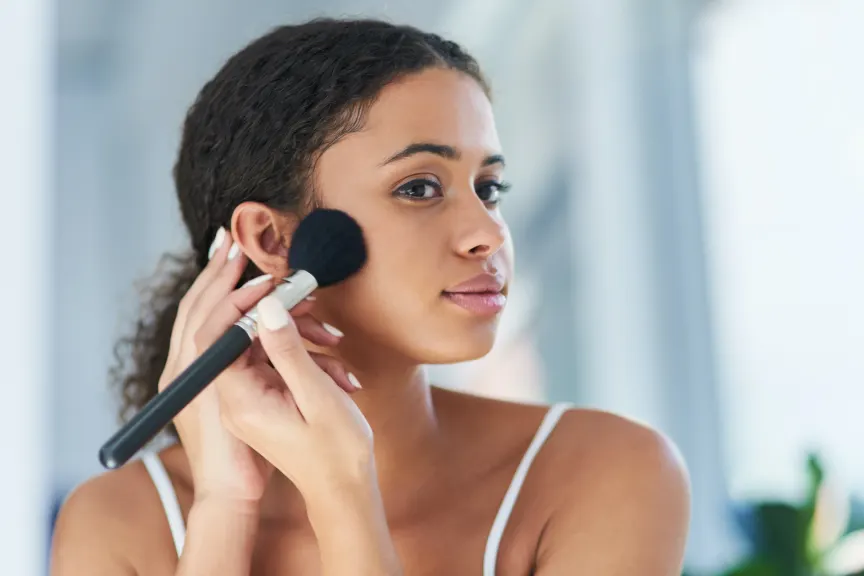From healthcentral.com
For your next night out, try these skin-sensitive products and expert ideas
PSORIASIS CAN BE tricky to deal with, especially if you’re a makeup lover. But that doesn’t mean lipstick, blush, and foundation are a no-go. In fact, some dermatologists say that makeup products and their ingredients are well-tolerated amongst people with psoriasis. For people with suspected psoriasis, patch testing products on the skin prior to regular use can help determine a person’s sensitivity to a product. However, some makeup can contain harmful ingredients that aggravate the skin and it’s important to know the difference. To keep irritated skin and psoriatic flares at bay, experts recommend the following makeup tips and products.
Makeup Ingredients to Avoid
While people with psoriasis tend to tolerate most makeup products and ingredients, reactions happen and vary on an individual basis. As a rule of thumb, Rachel Nazarian, M.D., a dermatologist in New York City and faculty member in the department of dermatology at Mount Sinai Medical Center, recommends avoiding alcohol-based products when possible because they tend to trigger a negative reaction. It “can dry skin out and worsen flaking and redness,” says Dr. Nazarian. If alcohol is in the ingredient list, it might also be labelled as “isopropyl alcohol,” or “ethanol,” she adds.
Also, steer clear of makeup made with abrasive ingredients like glitter (as pretty as it can be). According to Dr. Nazarian, these components can create skin irritation and trigger worsening of the psoriasis flare or can induce new lesions to form. Instead, Dr. Nazarian suggests looking for light powders that reflect shine, like Nars Light Reflecting Pressed Powder.
Fragrances, which are often packed with alcohol, can irritate skin, too. If you have products that contain fragrance (news flash: some foundations, blushes, and eyeshadows contain fragrance), Erum N. IIyas, M.D., a dermatologist at Schweiger Dermatology in Philadelphia, says to avoid using them on inflamed, open, or cracked skin. “Applying fragrance-containing products can be a bit uncomfortable if applied to open areas,” says Dr. Iiyas.
On the other hand, some products that contain natural fragrances like essential oils may help with psoriasis, including lavender oil. Research shows that topical application of lavender oil improved psoriasis severity by 73%.

Makeup Ingredients to Embrace
Because psoriasis causes redness and scaling, it can be difficult to conceal, especially with plaques (the raised, inflamed, and patchy areas of skin that are tell-tale for psoriasis). To combat this, Dr. Nazarian recommends adding products to your makeup regimen that provide full-coverage and have a hydrating element, such as dimethicone, which retains water and butylene glycol, a humectant and emollient that draws water to the skin. The CoverFX Foundation has both of those ingredients.
Moisturizing makeup kills two birds with one stone by hydrating the skin while providing medium to full coverage to conceal patchy areas. That’s why Dermablend products and the Tarte Shape Tape concealer come highly recommended by Dr. IIyas because they “provide excellent coverage and camouflage.”
Another thing to stock your makeup cabinet with: Products that contain natural oils like coconut and olive oils. “They are often anti-inflammatory and can decrease the irritation and redness associated with psoriasis flares,” says Dr. Nazarian. “Also, natural oils often soften and decrease the white scales of psoriasis which can make people self-conscious.”
To conceal inflamed flares, use concealer with green-ish undertones because it will “off-set the redness of psoriasis," she says. "This is a great trick to camouflage plaques.”
Application and Removal Tips
To apply your makeup, Dr. IIyas suggests using clean fingers or tools that are gentle on the skin, like cotton rounds, sponges, a beauty blender, or soft bristle brushes. These work best on psoriatic skin, says Dr. Nazarian, because they won’t irritate the plaques like some products that have rough or abrasive edges like cleaning brushes, beaded scrubs, exfoliating gloves, and apricot, walnut, or sugar scrubs.
Okay, so you have a big night planned and would like to wear makeup but noticed a flareup forming or a plaque spreading. What do you do? For starters, don’t stress! Next, reach for ointment-based or cream-based formulas, such as L’Oréal’s True Match Lumi Glotion. “[They] apply more elegantly to psoriatic plagues,” says Dr. Nazarian. “And avoid powder-based products that can look caked-on and enhance flaking.”
When you notice flares in areas where makeup has been applied, consider switching to a different type of applicator to see if that reduces the irritation. Dr. IIyas underscores that “understanding the role of friction and irritation in the Koebnerization of psoriasis can help patients gain a better understanding of their disease.”
The Koebner phenomenon is described as the appearance of new skin lesions on parts of the body that do not typically have psoriasis. Because some makeup products can cause irritation, it can initiate a Koebner response.
As for makeup removers, avoid excess use of makeup removers as they can irritate the skin, says Dr. IIyum. Instead of scrubbing, people can gently massage a foaming cleanser into the face and rinse off with lukewarm water.
People with psoriasis can enjoy all kinds of makeup but being aware of the composition of products can prevent the exacerbation of the condition.
“Another important thing for patients with psoriasis to understand is that there are excellent effective treatment options available [that make wearing makeup easier],” says Dr. IIyas. “Talk to your dermatologist about these options that can reduce the need for makeup to conceal the plaques in the first place.”
